Women and Date-Rape Drugs
- Do you think that open borders between the European countries have contributed in one way or other to the marketing of drugs and the free movement of drug dealers?
- During the years of your work in the field of drug control, have you been able to find out who are the people or groups behind the drug trade?
- Is the drug trade is a political and economic problem, or is it an indication of the deterioration of the political and economical conditions in countries where drug trade is most active?
I asked these questions during the presentation of the “International Narcotics Control Board 2009 Annual Report” held at Presseclub Concordia in Vienna on 24 February 2010. The conference was organized by the UNIS Information Service in a number of major cities around the world. In Vienna, many journalists attended the Press conference. Prof. Sevil Atasoy, President of the International Narcotics Control Board (INCB) presented the report. Maher Nasser, director of UNIS, briefed the attendants shortly while opening the session.
 Prof. Atasoy answered my question saying that the root of the drug problem is that the human beings sometimes need a tool to confront the problems of life. “Human beings have always been using something, for example a plant to chew. The issue is that we must reduce this demand. Therefore we must say that it’s enough to reduce this need for drugs. We can’t say that drugs are an economic problem. We can’t say that it is a problem of open borders. Everywhere, persons can have access to some of this material, and we must teach the people how to cope with stress and life without using drugs. The NGOs should teach people how to cope with life”.
Prof. Atasoy answered my question saying that the root of the drug problem is that the human beings sometimes need a tool to confront the problems of life. “Human beings have always been using something, for example a plant to chew. The issue is that we must reduce this demand. Therefore we must say that it’s enough to reduce this need for drugs. We can’t say that drugs are an economic problem. We can’t say that it is a problem of open borders. Everywhere, persons can have access to some of this material, and we must teach the people how to cope with stress and life without using drugs. The NGOs should teach people how to cope with life”.
Prof. Atasoy warned during her presentation that the use of so called “date-rape drugs” is on the rise. The INCB report raises the alarm about new psychoactive substances which are easier to obtain and under less stringent international controls.
The UNIS office released a statement by the executive director of the United Nations Office on Drugs and Crime (UNODC), Antonio Maria Costa, who said during a debate in the Security Council on global threats against international peace and security: “We must break the vicious circle between insecurity and under-development”. Costa also stated that “instability attracts crime, and crime deepens instability”, and he added “in a chain reaction, humanitarian crises follow, development is stalled, and peacekeepers are deployed”.
The report of UNIS in which they summarize the INCB annual report and the UNODC warnings is below.
INCB Warns of an Increase in the Use of “Date-Rape Drugs“
VIENNA, 24 February UNIS – The “date-rape drug” phenomenon is evolving rapidly, as sexual abusers attempt to circumvent more rigorous drug controls by using substances not restricted by the international drug conventions. Stricter control measures by governments, in close cooperation with the pharmaceutical industry, have been effective as reports about the misuse of Flunitrazepam have become rare. This benzodiazepine sold under the brand name Rohypnol was once so commonly misused for sexual assault that it was called the “date-rape drug”. In its Report, INCB calls on all governments to implement the pertinent Resolution 52/8 from March 2009 of the Commission on Narcotic Drugs to combat the misuse of pharmaceutical products to commit sexual assault as soon as possible and to be vigilant about the worrying increase in “date-rape drug” abuse.
Prevention of Drug Abuse
Society has to give urgent attention to preventing drug abuse, the Vienna-based International Narcotics Control Board said, underlining the need for more actions and commitment. Measures to prevent and reduce drug abuse by people who are either not using or not seriously involved with drugs – so-called primary prevention – are the focus of the first chapter of the Report.
“Preventing drug abuse is a crucial area of demand reduction. Primary prevention encompasses measures taken to prevent and reduce drug use in populations that are either not using or not seriously involved with drugs,” said INCB President, Professor Sevil Atasoy. “There is good reason for society to give concerted attention to preventing drug abuse. Even a single early drug using experience can result in serious consequences, such as unintentional injury, overdose or arrest.”
The Report calls on governments to re-establish the place of primary prevention alongside secondary prevention as well as on policy makers to establish a clear focal point for primary prevention. As primary prevention by governments alone will not suffice, there needs to be collaboration with non-governmental organizations (NGOs) and others.
INCB President Atasoy says: “Partnerships with civil society need to be forged at all levels, locally, nationally and internationally to ensure scarce resources are applied as efficiently as possible and to increase effectiveness in reducing the prevalence of drug use.” With limited resources, governments should pay attention to both young people who are not using or occasionally using drugs and to those using drugs frequently, underlines the Report.
Growing Problem of Prescription Drug Abuse
The Report says that abuse of prescription drugs has become a major concern in some countries. A greater number of people are abusing such drugs, even than those abusing heroin, cocaine and MDMA (“ecstasy”) put together in some countries. High profile celebrity deaths have shed light on the dangers of prescription drug abuse in 2009. Abuse of such drugs has been spreading over the world in recent years and INCB is calling for more awareness of this ‘hidden’ problem.
Prescription drug abuse needs to be tackled urgently in order to stop its further spreading and to prevent more fatal incidents amongst celebrities and others. The INCB recommends governments to either prohibit or closely control the sales of internationally controlled substances by Internet pharmacies and telephone call centers, in order to close down the illicit supply channels.
New Processes, Routes and Substances Used by Criminal Networks to Manufacture Drugs
Highly organized and powerful criminal networks are using new processes, routes and substances to keep drug manufacturing operations alive, warns the INCB. In the face of stricter controls of chemicals, traffickers are finding new ways to fuel their illegal exploits and are still able to obtain the chemicals they need from legal trade channels.
The demand for methamphetamine precursors has had serious repercussions throughout the Americas, where some governments are making major efforts to free their countries from the grip of powerful criminal organizations. As the Report indicates, the power of such networks is linked to the vast wealth generated by illicit drug manufacture, particularly of methamphetamine.
INCB is helping governments to efficiently exchange data on trade, diversions and seizures. Together with the INCB online system for pre-export notifications, the international collaborative initiatives and operations have resulted in more effective monitoring of suspicious transactions and the identification of trafficking trends and networks. Improved exchange of intelligence information has yielded significant results in targeting the diversion of chemicals.
Hundred Years of Drug Control, Major Landmark in International Cooperation
The year 2009 marked a century of multilateral drug control efforts which started when the International Opium Commission was convened in Shanghai, China, in February 1909. International drug control has evolved considerably over hundred years. A series of multilateral drug control agreements were concluded, leading up to the adoption of the three international drug control treaties that are the current framework for action in international drug control. To pay tribute to the achievements in international drug control, a special section of the Annual Report of the INCB is devoted to the commemoration of the convening of the International Opium Commission, which was held on 26 and 27 February 2009 in Shanghai, China.
At this landmark event, Professor Hamid Ghodse, then INCB President, recalled the spirit of the original Shanghai Conference, which met when the opium trade was very lucrative, generating millions of dollars in revenues. The challenges that the international community faces were important such as the under-utilization of narcotic drugs for medical purposes, Professor Ghodse said, adding that “Governments and the international community as a whole have to find a way to tackle them, bearing in mind the principles of shared responsibility, the sovereignty of nations, the territorial integrity of States and the need to address the world drug problem in a balanced and integrated manner.”
Regional Highlights
The Report highlights major trends in drug abuse and trafficking, region by region, around the globe. After years of increasing cocaine trafficking from South America through West Africa to Europe and to a lesser extent to North America, there was a decline in seizures of cocaine since 2008 and no large seizure in 2009 at all. However, smuggling remains a serious problem and contributes to increasing drug abuse in West Africa.
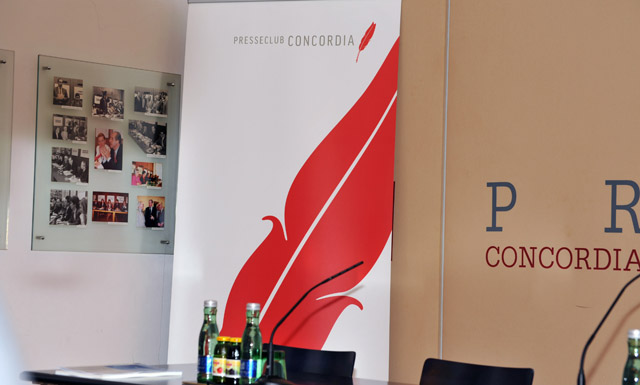
Drug trafficking has become a major security threat in Central America and the Caribbean and has an impact on the increasing drug abuse and homicides linked to organized crime. While measures taken by the Mexican Government, including the deployment of military troops, have resulted in the disruption of drug trafficking operations throughout North America, organized criminal groups have expanded their control over drug trafficking operations throughout the continent. Mexican drug cartels have expanded their control to cover the entire supply chain for illicit drugs, from shipment from South America to distribution in the United States. In South America, the total potential manufacture of cocaine of the region decreased and constitutes the lowest output since 2003, due to a significant decrease in Colombia.
After tremendous progress in East and South-East Asia in the past, countries in the region faced setbacks in reducing illicit opium poppy cultivation in 2008. Trafficking in methamphetamine and illicit manufacture of MDMA (“ecstasy”) also increased. Seizures of amphetamine-type stimulants in South Asia show that trafficking in the substances may be increasing in the region. India has emerged as one of the main sources of drugs sold through illegal Internet pharmacies, where orders placed abroad are dispatched to buyers using courier and postal services, which have became a common means of smuggling drugs abroad. After peaking in 2007, illicit cultivation of opium poppy and the illicit production of opium in West Asia decreased in 2008 and 2009.
A decline in the abuse of cannabis and cocaine has been observed in the United Kingdom and Spain. The abuse of cocaine is stable or declining in Austria, Germany and Switzerland, but increasing in France and Ireland. Likewise, the abuse of amphetamines and MDMA (“ecstasy”) is stabilizing or decreasing in Europe. In Denmark, Spain and, to a limited extent in the United Kingdom, drug users are replacing those drugs with cocaine. Europe remains the largest market for cannabis resin. Spain accounts for the largest total amount of global seizures of cannabis resin.
The demand for MDMA (“ecstasy”) in Australia has increased in recent years. The smuggling of pharmaceutical preparations containing pseudoephedrine into New Zealand has been rising significantly. In spite of closer regional cooperation to address drug control issues, the low rate of accession by States in Oceania to the international drug control treaties and the geographical proximity of the region to illicit drug manufacturing in South-East Asia make the region more vulnerable to drug trafficking.
Organized Crime Deepens Humanitarian Crises, Warns UNODC
VIENNA, 24 February (UN Information Service) – “We must break the vicious circle between insecurity and under development,” said the Executive Director of the United Nations Office on Drugs and Crime (UNODC), Antonio Maria Costa, at a debate in the Security Council today on global threats against international peace and security. “Instability attracts crime, and crime deepens instability,” said Mr. Costa. “In a chain reaction, humanitarian crises follow, development is stalled, and peacekeepers are deployed,” said Mr. Costa. To illustrate the problem, UNODC issued a report on Crime and Instability: case studies of transnational threats. The report focuses in particular on the impact of drug flows (cocaine and heroin), as well as piracy around the Horn of Africa, and minerals smuggling in Central Africa.
To reduce vulnerability to trans-national threats, Mr. Costa underlined the need for development and security: “But we cannot just throw money or troops at this problem, we also need law enforcement.” He underlined the need for States to make more effective use of the United Nations Convention against Transnational Organized Crime which was adopted a decade ago. Parties to the treaty, also known as the Palermo Convention, will meet this October in Vienna to review implementation.
Mr. Costa called for more intelligence-sharing and vigilance to fill the “black holes” where criminals operate with impunity: “There are many blank spots on our radar screens and our ignorance about what goes on has deadly consequences,” he warned. He highlighted the recent discovery of a fleet of cargo planes bringing cocaine into West Africa and the Sahel. “What is shocking is that most major discoveries of illicit activity are being made by accident,” said Mr. Costa.
Mr. Costa said that a change in attitude is essential in order to tackle transnational threats. “It is time to regard intelligence-sharing as a way of strengthening sovereignty, not surrendering it,” said the head of UNODC. “When police stop at borders while criminals cross them freely, sovereignty is already breached – it is surrendered to those who break the law,” he said. He therefore called for regional networks to monitor flows, share intelligence and carry out joint operations.
Since criminals are motivated by money, the way to increase their risks and reduce their benefits is to go after their assets. Mr. Costa therefore urged Member States to strengthen measures against corruption and money-laundering. To illustrate the massive profits made by crime he said: “One line of cocaine snorted in Europe kills one square metre of Andean rain forest, and buys 100 rounds of AK-47 ammunition in West Africa. Multiply this by 850 tons of cocaine per year and you see that is a bigger mismatch than David versus Goliath.”
Because of the cross-cutting nature of organized crime, Mr. Costa called for a system-wide response, like putting criminal justice into the mainstream of all relevant UN operations, and holding periodic debates on the threat posed by organized crime to stability.
A Presidential statement issued during the debate made a number of recommendations on how to strengthen the response of Member States and the United Nations to transnational threats.
Possibly related posts (automatically generated):
- The TIPH and Israeli Crimes in Hebron On December 8, 2007 I wrote to Karl-Henrik Sjursen, head of the TIPH Mission, to his Secretary, his Deputy, to...
- Call for creation of UN War Crimes Commission The International Progress Organization, headed by Dr. Hans Koechler, sent me the statement below War on Gaza: Call for creation...
- Honor Killings In Palestine Last Saturday 16 May 2009, Halimeh Ahmad Al-Sheikh from Qalqilyah was found dead near the Atara checkpoint north of Ramallah....
- UN Employees Disrespect UN Resolutions Boycott Ahava Dead Sea Cosmetics Today I received the latest news sent to me by the women in black in...
- The UN Must End Israel War Crimes Following the activities of the “Annual Observance of the International Day of Solidarity with the Palestinian People” which was held...







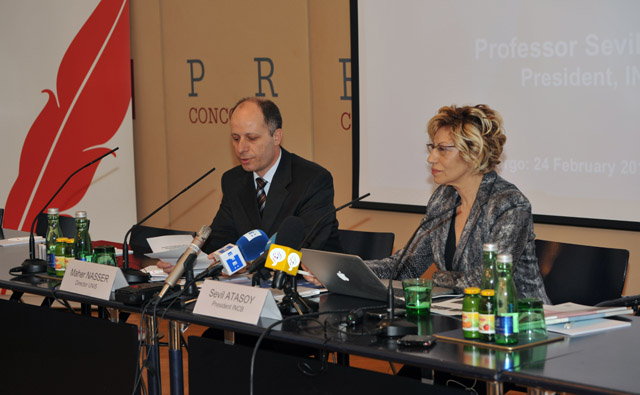
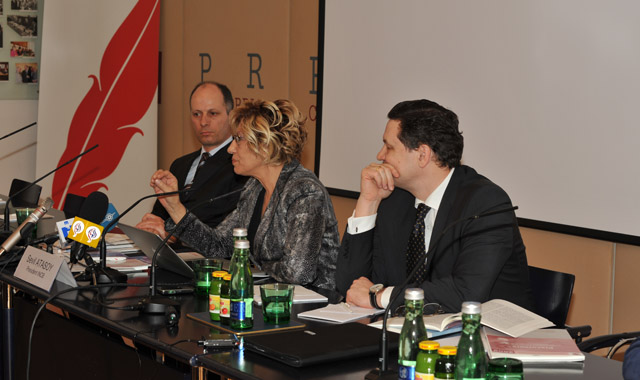


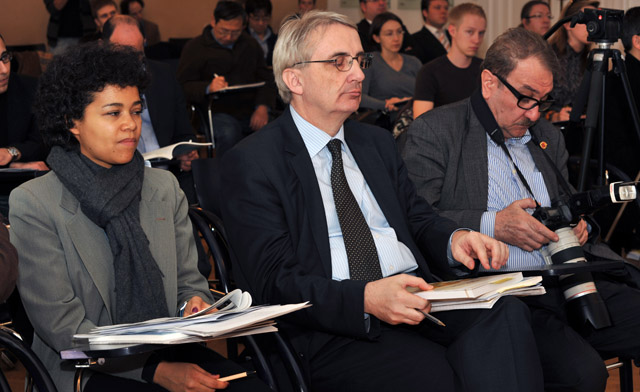
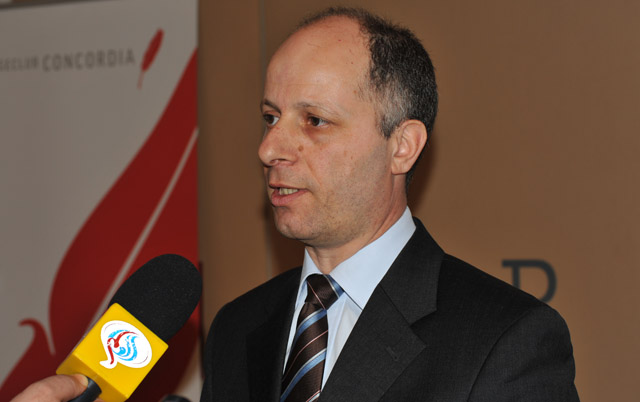




No comments:
Post a Comment